(A) Exercise 1.Find modal verb + passive infinitive in the following sentences. Translate the sentences.
1. Students Union provides common rooms, libraries, and halls where dances, debates, concerts and lectures may be held.
2. Individual tuition can be given at tutorials, while seminars are a form of group teaching.
3. Education in Great Britain may be subdivided into full-time and part-time, vocational and non-vocational.
4. Technologies, technicians and craftsmen can be produced by polytechnics.
5. An original paper or thesis has to be written to become Masters of Arts or Science.
(B) Exercise 2. Form passive infinitives.

1. The article can … (to translate) at the lesson.
2. The lesson must … (to attend) regularly.
3. The plants should … (to water) every day.
4. The text can … (to divide) into three parts.
5. The tractor must … (to repair) at the workshop.
6. The work has to … (to do) in time.
(C) Exercise 3. Turn the sentences into the Passive. Use modal verb+passive infinitives.
1. Engineers must know the properties of engineering.
2. We can divide all materials as metals and non-metals.
3. He may use these reference books for his report.
4. They can produce all the units of a new tractor at this plant.
5. This new plant is to build farm equipment.
Participle II

(A) Exercise 1. Identify the Participle II, its function and translate the sentences.
1. There is no single, universally accepted definition of what a university should be like.
2. Some courses include a one-week instruction of residential schools, usually offered during the summer.
3. The courses given in the school are designed to provide a broad education in the fundamental mechanical engineering sciences and in economics.
4. Occupied by his thoughts, the student didn’t hear the question.
5. The results of the test were not optimistic. He felt disappointed.
6. You can expect to have exam questions based on the lecture.
(B) Exercise 2. Mind the use of the Participle II. Complete these sentences with the correct form of the verb in brackets.
1. A degree is an academic qualification … (to award) at most universities and colleges upon completion of a higher educational course.
2. Those who want to become Masters of Arts or Science have to write an original paper … (to base) on a short period of research.
3. In large universities graduates students … (to call) teaching assistants usually conduct discussion sessions.
4. Some of the courses … (to know) as sandwich courses, combine academic study with training in industry.
5. The method … (to use) is important for experiments.
6. Water becomes ice when … (to cool).
(B) Exercise 3. Paraphrase the sentences using the Participle II. Follow the model.
Model: Yesterday I read an article that was published in “The Times”.
Yesterday I read an article published in “The Times”.
1. Did you see the contract that was signed last week?
2. Did you hear an announcement that was made on the radio?
3. The problem that was discussed at the conference yesterday is of great importance.
4. John took part in the conference which was held in Paris last week.
5. One of the tractors that were tested yesterday needs repairing.
(B) Exercise 4. Complete these sentences with the correct form of the Participle II.
1. He took up the diary and turned the closely … (исписанные) pages.
2. She sat down on a … (упавшее) tree and began waiting.
3. He lay there with his eyes … (закрытыми).
4.  When … (смонтирована, собрана-to assemble) the car undergoes various tests.
When … (смонтирована, собрана-to assemble) the car undergoes various tests.
5. The results … (полученные) were carefully studied.
(C) Exercise 5. Translate from Russian into English.
1. Вы читали статьи, опубликованные в этом научном журнале?
2. Когда вода замерзает (tofreeze), она представляет собой бесцветное твердое(solid) вещество - лед.
3. Автомобили, производимые в нашей стране, экспортируются во все страны мира.
4. Студент изучил все вопросы, записанные им на лекции.
5. Он ничего не ответил, как будто находился под впечатлением (toimpress) от моих слов.
(C) Exercise 6. Complete these sentences with the correct form of the Participle II in different functions.
1. Where is the article…?
2. He looked very ….
3. He was always polite when ….
4. He kept silent as if ….
5. Though…, he tried to answer the question….
 Rronouns
Rronouns
(A, B, C) Exercise 1. Fill in the gaps with personal pronouns.
1. I work for my mother. I help … in the shop. And she gives … some money.
2. We have two dogs. We often take … for a walk. We also take a ball and our dogs like to play with ….
3. My brother works at the hospital. … is a doctor.
4. My favorite subject is Physics. … is very exciting.
5. Tom is a good lawyer. Do you know …?
6. Look at her. … is so beautiful!
7. Where is my notebook? I can’t find ….
8. We are going to the beach. You can join …
9. I like Kate’s hair. … is so thick and long.
10. These are my souvenirs. … bought … in England.
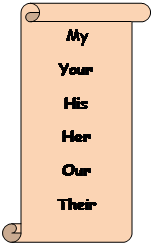 (A, B, C) Exercise 2. Complete the sentences using possessive pronouns.
(A, B, C) Exercise 2. Complete the sentences using possessive pronouns.
1. I left … car in the garage.
2. Mary hung … coat on the hook.
3. Jack had … hair cut.
4. Neil and David ate … supper.
5. I hope you enjoy … holiday.
6. You must make up … own mind.
7. The children had to cook … own supper.
8. Bill borrowed Jenny’s car. … own car was being repaired.
9. I’ll bring … own sheets and towels.
10. Every dog had … own special basket to sleep in.
(A, B, C) Exercise 3.Complete the sentences with reflexive pronouns (self/selves).
Example.
The water is hot, don’t burn.... The water is hot, don’t burn yourself.
1. I am angry with...
2. He fell down and hurt …
3. Tell me more about...
4. She believes in …
5. We are sure of...
6. They did everything...
7. Did you translate the text...
8. I saw everything...
9. The knife was sharp, and she cut...
10. They introduced...
(A, B, C) Exercise 4.Fill in the gaps .
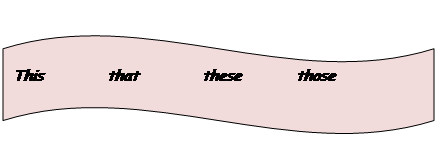
1. … people over there are waiting for the bus
2. The day I first came to London was wonderful. I will remember … day for ever.
3. … summer I'm pretty busy.
4. I'm working as a receptionist … days.
5. … were the days!
6. Do you remember … winter when we all went to Egypt?
7. Hello! … is Alan. Can I speak to Harry, please?
8. … is a new cathedral and … one over there was built 900 years ago.
9. Will you come over at five o'clock? I'll be at home at … time.
10. The summer of 1999 I spent in the country. I remember we had a lot of rain … year.
(A, B, C) Exercise 5.Complete the sentences with some/any/no.
1. There is _______ tea in the crystal glass, but it is very hot.
2. There is _______ fresh milk in the fridge. I can't make porridge.
3. Are there ________ tasty apples in the bag?
4. There isn't _______ jam on the round plate.
5. There are _______ bananas on the wooden table. They are yellow.
6. There is ________ butter on the plate.
7. There is ______ cheese on the table, but there’re _______ cheese sandwiches.
8. There isn't _________ sausage on the table.
9. There are ____________ potatoes in the bag.
 10. There aren't __________ bananas on the table, but there are _______ cucumbers there.
10. There aren't __________ bananas on the table, but there are _______ cucumbers there.
(A, B, C) Exercise 6. Choose the correct variant.
1. Why are you looking under the table? Have you lost anything/ something?
2. Do they live somewhere / anywhere near Suvorov Street?
3. There is anything / something in my soup. It’s mosquito!
4. I’m thirsty. Can I have some / any cold juice?
5. He can do the job alone. He doesn’t need anybody else’s / somebody else’s help.
6. We cannot close our eyes to the facts some / any longer.
7. If anybody / somebody asks about me I’m at Kate’s.
8. She can’t have lost the tickets! They have got to be anywhere / somewhere!
9. I’ve lost my way! Isn’t there anyone / someone who could direct me to Victory Square?
10. There is hardly anybody / somebody to be seen on the streets of the centre after dusk.

(A, B, C) Exercise 7. Choose the appropriate answer.
1. They have too (many/much) furniture in the room.
2. There are too (many/much) books on your desk.
3. You have too (many/much) mistakes in the test.
4. You must drink (many/much) coffee.
5. You put too (many/much) vegetables in the soup.
6. You put too (many/much) fruit in the salad.
7. Must we learn (many /much) words for today?
8. We have got (many /much) sandwiches.
(A, B, C) Exercise 8. Complete the questions. Use interrogative pronouns.
1. _____ kind of car have you got?
2. _____ is your favorite sport?
3. _____ ocean is bigger-the Atlantic or the Pacific?
4. _____ book is this? Is it yours?
5. _____ are you from? Are you English?
6. _____ do you usually have your summer holiday?
7. _____ are you in bed? Are you ill?
8. _____ do you go to work? Do you go by car?
9. _____ is your friend? Is he over 21?
10. _____ are you? Are you over 1 meter 80?
(A, B, C) Exercise 9. Rewrite the story using pronouns instead of the symbols.

(B, C) Exercise 10. Fill the gaps with personal or reflexive pronouns.
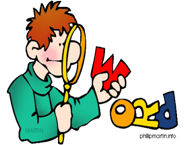
1. He is quite right, I agree with … completely.
2. I looked at … in the mirror and left the house in a very good mood.
3. “Who is it?” — “It’s …. May I come in?”
4. Mr. Lloyds is very fat. … weight is over a hundred kilos.
5. … introduced his wife to the guests.
6. Where shall … meet, Bob?
7. James took the book and opened …
8. Did your mother buy anything for … last week?
9. I taught … to play the guitar.
10. Selfish people only care about …
(B, C) Exercise 11. Fill the gaps with reciprocal pronouns or reflexive pronouns (each other/one another or –self/selves).
1. Look at _____________! Your face is dirty.
2. How long have Tom and Ann known ______________?
3. At Christmas friends often give ___________ presents.
4. I enjoyed ___________ very much at the party.
5. Jack and Jill are very happy together. They love ___________ very much.
6. She has no reason to blame ___________.
7. I think this poor dog has hurt ___________.
 (B, C) Exercise 12. Translate the Russian fragments into English using the correct pronouns.
(B, C) Exercise 12. Translate the Russian fragments into English using the correct pronouns.
1. We are both vegetarians. (Никто) _______ of us eats meat.
2. They’ve sent me only two of the five books I ordered. (другие) _______ haven’t come yet.
3. Very (мало) _______shops can offer such a variety of services as this one.
4. (Ниодна) _______ of these photos were familiar to me.
5. (Еще) _______ two uneventful days have passed.
6. (Каждый) _______of them was dressed up for the occasion.
7. Have you been offered (какую-нибудь / другую) _______ job?
8. Please, keep (другой) _______ end of the rope tight.
9. (Никто) _______of you I need to worry about my problems.
10. I enjoyed (каждую) _______ minute of my stay in London.
 Word order
Word order
(A) Exercise 1. Mark whether the statement is Correct (with a subject or predicate) or Wrong (without a subject or predicate):
1. Helate. 
2. Weareearly. 
3. Maryisathome. 
4. Johnatwork. 
5. I am a manager. 
6. Heislate. 
7. My name is Peter Brown. 
8. I amBritish. 
9. TessaItalian. 
10. Thisourhouse. 
(A) Exercise 2. Mark whether the statement is Correct (the word oder is correct) or Wrong (the word oder is wrong):
Начало формы
1. Iswheremybook? 
2. We in the central library are now.  . Are you in the central library now?
. Are you in the central library now? 
3. Isyoursister OK? 
4. Howoldam I? 
5. Are you free on Sunday? 
6. When are you usually home? 
7. They not are my friends?  Theyaremyfriends?
Theyaremyfriends? 
8. What colour your car is? 
9. I am not good at English?  I am good at English?
I am good at English? 
10. Your new is great plan? 
(A) Exercise 3. Define the correct word order in English declarative sentences.
1. играют / вечером/ они/ в парке/ в футбол._____________________________________________________
2. Свою/ отдал/ брат/ коллекцию/ мне.________________________________________________________
3. на занятиях/ что-то/ они/ шумно/ обсуждают.__________________________________________________
4. мы/ всем/ родственникам/ приглашения/ отправили.__________________________________________________
5. в кафе/ встречались/ они/ вчера вечером____________________________________________________
6. Мама/ мне/ письмо/ передала/ от друга.______________________________________________________
7. вёл/ машину/ он/ медленно.___________________________________________________
8. На уроке/ мы/ слова/ вслух/ читали._____________________________________________________
(A) Exercise 4. Write special and alternative questions to the answers.
Example:
He speaks German well. – Who speaks German well? / Does he speak German or English well?
1. We went to the library.
2. He is a driver.
3. We were playing a game.
4. They came to this place a long time ago.
(A, B, C) Exercise 5. Complete the tag questions.
1. The books about animals are real fun, …
2. You really like reading magazines, …
 3. You can go to the library tomorrow, …
3. You can go to the library tomorrow, …
4. Your mum thinks adventure stories are exciting, …
5. You haven't seen «Harry Potter» yet, …
(B) Exercise 6. State whether the word order in the statements is right or wrong. Rewrite the wrong statements as in the example.
Example:
Tom walks every morning to work. (wrong) – Tom walks to work every morning.
1. Jim doesn't like very much baseball.
2. Ann drives every day her car to work.
3. When I heard the news, I immediately called Tom.
4. Maria speaks very well English.
5. After eating quickly my dinner, I went out.
6. You watch all the time television.
7. Liz smokes about 20 cigarettes every day.
8. I think I'll go early to bed tonight.
9. You should go to the dentist every six months.
10. We went last night to the movies.
11. We go every summer to the sea in August.
12. In the evening my parents go to the cinema with their friends.
(A, B) Exercise 7. Fill in the words to form questions.
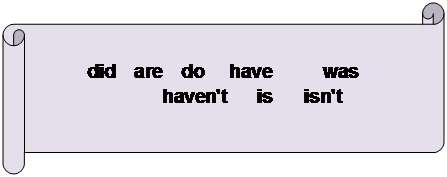 |
1. What types of books ______ you like to read?
2. _____ she reading love story or an adventure story?
3. ______ you seen «Titanic»?
4. Who _____ watching TV at eight o'clock last night?
5. It's an exciting book, ________ it?
6. _____ you going to watch a romantic film or a musical?
7. You have seen this film, _______ you.
8. _____ you go to the cinema last night?
 (A, B) Exercise 8. Group the question from Ex. 7 by their types.
(A, B) Exercise 8. Group the question from Ex. 7 by their types.
Yes / No Questions: ______________.
Alternative Questions: ______________.
Special Questions: ______________.
Tag Questions: ______________.
(B) Exercise 9. Form questions.
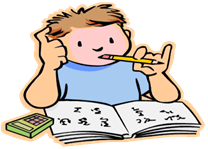
1. birthday / is / when / your?
2. many / How / cards / did / get / you?
3. do / What / like / your / presents?
4. mum / What / make / did / cake / your?
5. at the party / you / did / what / do?
6. like / you / parties / do / Why?
7. summer / are / this / where / you / going?
8. there / going / How / you / are?
9. take / going / to / what / you / are?
10. with / are / you / Who / going?
(B) Exercise 10. Write questions to the following sentences beginning with the words in brackets.
1. My sister eats sweets every day. (Who)
2. He won't go to the country this summer. (Will)
3. We were advised to come. (What?)
4. I haven't seen Peter since Saturday. (How long?)
5. They are planning to have a holiday soon. (They)
6. She made a beautiful dress for herself last week. (What?)
7. Everybody was waiting at the door to the museum. (Was)
8. By the end of the year he had read about twenty books. (How many?)
9. He is followed by his friend everywhere. (Who… by?)
10. He didn't know how he could help his friend. (Why?)

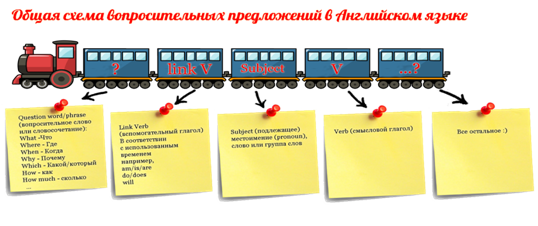
(C) Exercise 11. Make up sentences paying attention to the word order.
1. he /won / easily / the game
2. volleyball / every weekend / Tom / play / does?
3. Quietly / the door / I / closed
4. her name/ after a few minutes / I / remembered
5. what / to her parents / Liz / write / every day /does?
6. didn’t they / some interesting books / found / they / in the library?
7. across from the park / they / a new hotel / are building
8. to the bank / you / to the supermarket / every Wednesday / go / or?
9. on Friday night / didn't see / at the party / her / you?
10. hard / is / raining / it / outside?
11. in / lives / my / sister / dormitory
12. a / became / engineer / qualified / who?

(C) Exercise 12. Write questions to the underlined parts of the text.
The academic year in England has three terms; each term lasts from eight to ten weeks. Terminal examinations take place at the end of autumn, spring and summer terms. Final examinations take place at the end of the course of studies. If a student fails in an examination, he may be allowed to take the exam again. Only two re-examinations are usually allowed.
